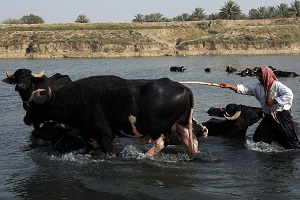The Agony of Iraq, the Country of My Birth

A local farmer from the Fedaliyah area of New Baghdad
herds his jammous into the Diyala River to cool off.
As a seventeen year old, in 1962, I was one of a group of about 10 Iraqi students doing A levels in a college in the UK. The group included three Christians, one Kurd and the rest were Muslims. Please do not ask me how many of the Muslims were Shia and how many were Sunni. I had no idea and neither had anyone else. I only knew of the religion and ethnicity of others through casual conversations. That is not how we defined ourselves. The only label that mattered was that we were all Iraqis.
Not long ago I was sent a list of Iraqi politicians and members of the Iraqi parliament, and against each name was written the label Shia, Sunni, Kurdish, Christian and other designations defining ethnicity or sect. I wrote back decrying the fact that if intellectuals and opinion-formers were engaging in defining people with these labels, how could we blame the rest of Iraqi society for doing the same?
The illegal Iraq war has melted the glue that bound Iraqi society together. Paul Bremer, the American viceroy in charge of Iraq after the war, headed the Coalition Provisional Authority whose members were based on quotas representing the mosaic of Iraqi society. It thus deliberately employed the maxim of divide and rule. But why should the Iraqis expect otherwise? The American aim, supported by Britain, was to occupy Iraq and control its oil, and this is the tried and tested way of all occupiers and colonizers.
Iraqi society is now divided on ethnic and sectarian lines; it has become the theatre where Iraq’s neighbouring countries fight their petty squabbles through gangs and terror groups, with ordinary people paying with their lives. Of course foreign powers and neighbours will meddle in a weak divided country to protect their interests as they see them, not necessarily the interests of the ordinary people in those countries, but in the main the interests of their own elites and corporations that are in charge behind the scenes, regardless of the politicians forming their governments.
Iraq has suffered a colossal loss of life and injury, dislocation and destruction; the misery visited on its people is beyond comprehension. The one positive thing is that the tyrant Saddam has been removed. The yearning of people for their basic right to stay alive and their need for the necessities of life, clean water, electricity etc. is making large numbers of them nostalgic for a Saddam-like figure able to deal with the violence and provide the essentials of a normal life.
What an irony it is that at the very moment when the revolutionary youth of the Arab world are making the ultimate sacrifice to wrest control from the tyrannical dinosaurs that ruled them for so long, Iraq seems to be heading in the opposite direction.
Will Iraqi intellectuals and politicians be able to lift their gaze from contemplating their navels long enough to see the catastrophe engulfing the nation? Will it be possible for the Iraqi intelligentsia to think beyond their sect and look at themselves as Iraqis? It was not that long ago we could do that. We can do it again.
Many Iraqis I talk to tell me the situation is hopeless; they blame foreign powers, corrupt politicians, and meddling by neighbouring countries. Yes, the injustice and the suffering have been immense. Yes, there is meddling and corruption. But it is time for the Iraqis to take charge of their destiny. Intellectuals and opinion-formers, please direct your energy to the worthy aim of uniting the people. The sheer will of a united people can force change on reluctant politicians, or their removal. The people of Egypt and Tunisia have shown us the way.
___________________________________________________________________________________
Dr Adnan Al-Daini took early retirement in 2005 as a principal lecturer in Mechanical Engineering at a British University. His PhD in Mechanical Engineering is from Birmingham University, UK. He has published numerous applied scientific research papers covering heat transfer, fluid flow and energy utilization in many industrial applications. He is a British citizen born in Iraq. Since retirement he has devoted his time and energy to building bridges and understanding between minority communities, particularly the Muslim community and the wider community in the South West of England. He was Chair of Devon Racial Equality Council between 2007/8. Adnan is a contributing writer for the Huffington Post.
___________________________________________________________________________________
URL: http://www.a-w-i-p.com/index.php/2011/12/30/the-agony-of-iraq-the-country-of-my-birt
























